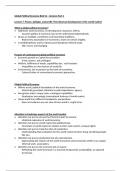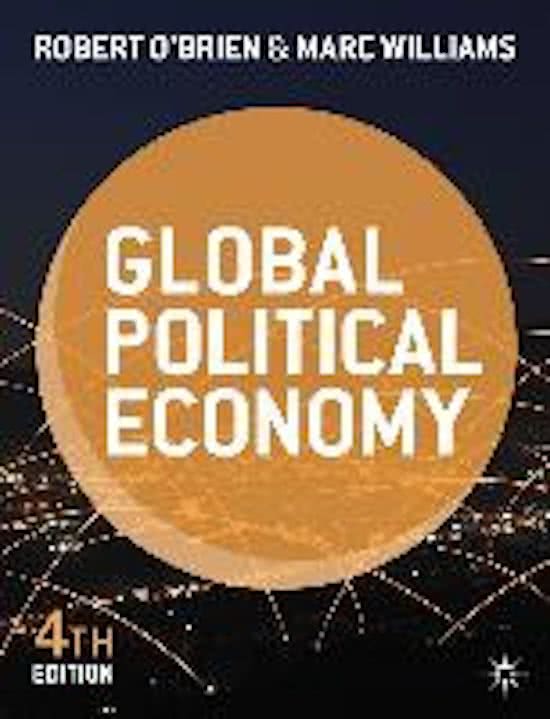Global Political Economy BA2 S2 – lectures Part 2
Lecture 7: Power, (pillage), and profit: The historical development of the world market
What is global political economy?
• Addresses world economy, its development, dynamics, effects.
- Assumes politics & economy may not be understood independently.
• Draws on multiple, sometimes rival theoretical traditions.
- Rejects key assumptions of economics, draws on certain insights.
• A multidisciplinary and in respects post-disciplinary field of study.
- Old, recent, and changing.
Focuses of contemporary global political economy
• Economic growth or Capital Accumulation.
- A key concern, not privileged.
• Welfare, fulfilment of needs, capabilities dev, ‘real freedom’.
- Inequalities as a key feature of social life.
• Environment, the ecosystem as the basis of economies.
- Colossal failure of conventional economic approaches.
Global Political Economy
• Affirms social, political foundations of the world economy.
- Historically grounded, attention to path dependence, agency.
• Recognizes states’ unique roles, contingent capabilities.
- Emphasizes increasingly transnational features of world market.
• Views world from different standpoints, perspectives.
- Does not embrace any one view of how world is, ought to be.
Attention to backstage aspects of the world market
• Attention not just on present but historical path to present.
- Historical expansion of world economy.
• Attention not just on world market but political basis.
- Formation of world market in relation to inter-state system, unequal rights
• Attention not just on trade but sites of production.
- Understanding that production for the world market involves living, breathing people
like you.
• Attention not just on production but also reproduction.
- Appreciating the reliance of the world economies and economies within it on unpaid,
informal work, social policy.
• Attention not just on the economy but on nature.
- Rethinking the world economy in a way that foregrounds sustainability, as opposed
to old way.
,Theoretical traditions
1. Liberal, neo-classical (economics) political economy
2. Critical political economy
3. ‘State centered’ | Nationalist | ‘developmentalist’
Analytical focuses and perspectives
1. Broadening performance analytics
• Not only/mainly growth => welfare, inequality, environment
2. Globalizing global political economy
• Diversity, world history, area studies, interdependence
3. Multi-dimensional awareness
• E.g., Location, time, status/class, gender, ethnicity, racism
Neoclassical Economics & GPE
• Markets based on voluntary exchanges.
- Human beings are rational, markets are efficient.
• Free trade produces mutual benefits.
- Efficient and equitable
- e.g., comparative advantage, factor-price equalization
• A world defined by market “frictions”.
- Constraints on trade, Gov’t policy, ‘distortions’
• Recent ‘discovery’ of politics, institutions
- Liberal institutionalist theory (e.g. Keohane)
Diversity with Neo-classical political economy
• Champions of capitalism, “free-trade” and markets
- E.g., Baghwati and Neoliberals
• Keynesian and post-Keynesian
- E.g., J. Stiglitz and Dani Rodrik
• New Institutionalism
- E.g., Douglas North, Robinson and Acemoglu
Critical Political Economy
• Exploitive nature of capitalist social relations
- World economy founded on unequal exchange, that is taking place against a
background of domination and dispossession. Enrichment of some, at the expense of
others.
• Countries’ structural modes of integration
- Difficult to overcome, limited mobility
• ‘Combined and uneven development’
, - Internal processes of exploitation
- External processes of dependence
Diversity in critical political economy
• Marx
- Class struggle, exploitation, consciousness, revolution
• Weber
- Class status and party as shaping opportunity, life chances
• Polanyi
- Origins of market-pattern across time as an elite project
State-centered perspectives
• States in the world economy
- Assumes inseparability of politics & economy but….
- Influence of neoclassical economics
- State centrism
• Theories of state behaviour – what they do and why
- Two-level games (domestic/international concerns)
- E.g. states motivated by a singular ‘national interest’
• Mix of “markets” and political institutions
- Democratic, authoritarian regimes, etc.
A plurality of perspectives, normative orientations
• Neoclassical economics, orthodox/heterodox etc.
- Keynesianism, ‘New Institutional Economics’
• Old and new varieties of state theory, social science institutionalism
- ‘Effective states’
• Critical political economy, including Marx, Weber, Polanyi, Harvey
- Critical because developed through critique
• Perspectives on issues: growth, welfare, inequality, ecology
• Intersectionality: place, sex/gender, ethnicity, racism, other…
Historical capitalism and trade (1431-2020)
Theorizing the historical development of capitalism
• One world economy
• Competing narratives, competing theoretical traditions
, • Multi-dimensional focuses within these stories
• Advantages and drawbacks of theoretical pluralism
Development of the world economy or world market
• Trade
• Finance
• Production
• Labor flows/limits
• Interstate system, political aspects
• Hegemonic cycles, world economic orders
• 500–, 70–, 40 year views
• Phases of the world market
‘Economic globalization’ – Realization of world market
• Expansion, intensification of cross-border ties
• Increased integration and interdependence
• Facilitated by politics and institutional change
• Facilitated by advances in transport, ICT, financial instruments
• Limits on scope of national economic management
When did globalization start?
• 1990s?
• 1930s, 1945?
• 1870s-1914
• 1431, 1492
• Conquest, colonialism, capitalism => formation of world market
Phases of Historical Capitalism up to 20th C
• Markets trace to antiquity
• Capitalism’s origins
- First in Europe, Europe-centered
• Long distance merchant trade
- Mercantilism
• Colonial expansion
- Conquest, exploitation
• ‘Imperialism’ and its meanings
• Industrial capitalism
- Massive uptick in productivity
• Post WWII Development project





